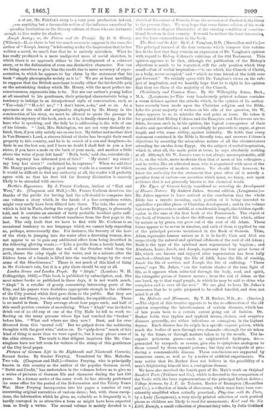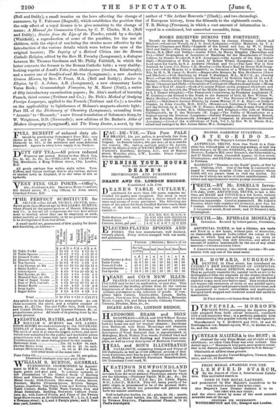On Malaria and Miasmata. By T. H. Barker, M.D., &c.
(Davies.) —The object of this treatise appears to be the re-affirmation of the old opinion respecting the infectiousness of certain diseases, which has of late years been to a certain extent going out of fashion. Dr. Barker holds that typhus and typhoid fevers, cholera, and eruptive diseases generally, are either infectious or contagious in the highest degree. Each disease has its origin in a specific organic poison, which reach the bodies of men through two channels—through the air taken in by the lungs, or through matters taken in by the mouth. The in- organic poisonous gases—such as sulphuretted hydrogen, &c.-- generated by cesspools or sewers, give rise to symptoms analogous to those caused by these organic poisons ; but they are incapable of pro- ducing a communicable disease. These conclusions are supported by numerous cases, as well as by a series of artificial experiments. We may notice that Dr. Barker does not believe in the possibility of a man's frightening himself into a contagious disease.
We have also received the fourth part of Dr. 3luir's work on Original Sanskrit Texts (Triibner and Co.), which is devoted to the comparison of the Vedic with the later representations of the principal Indian deities ; Village Sermons, by J. F. de Teissier, Rector of Brampton (Macmillan and Co.), a collection of heads of discourses, which must have been con- siderably amplified when actually preached ; Play-time with the Poets, by a Lady (Longmans), a very nicely printed selection of such poetical pieces as children are likely to read for amusement ; Karl and the Six Little Dwarfs, a small collection-of pleasant fairy tales, by Julia Goddard (Bell anti Daldy), a small treatise on the laws affecting the change of surnames, by T. Falconer (Regnell), which establishes the position that the only effect of a royal licence is to give notoriety to the change of 'name; A Manual for Communion Classes, by C. P. Clarke, MA. (Bell and Daldy); Stories from the Lips of the Teacher, retold by a disciple (Whitfield), a reproduction of some of the parables, for the use of children, with the object of rendering the stories more effective by the introduction of the various details which were before the eyes of the original hearers; The Inquiry of a Retired Citizen into the Roman Catholic Religion, edited by the Rev. H. Formby (Longmans), a dialogue between Mr. Thomas Goodman and Mr. Philip Faithf all, in which the latter converts the former to the Roman Catholic faith; a very shabby- looking reprint of Lamb's Tales from Shakespeare (Gordon, Edinburgh), and a neater one of Sandford and Merton (Longmans); a new Anak,cta Graeca Minora, by Rev. P. Frost, M.A. (Bell and Daldy); Ductor in Elegias, by C. A. Johns, AB. (Longmans), a new elementary Latin Verse Book ; Grammatologie Franfaise, by M. Marsd (Nutt), a series of fifty introductory examination papers ; Dr. Aim's method of learning French, third course (Triibner and Co.); Dr. Pick's Method of Studying Foreign Languages, applied to the French (Triibner and Co.); a treatise on the applicability to lighthouses of Holmes's magneto-electric light; Part ILL of the Dictionary of Chemistry (Longmans), extending from "Arsenic" to "Bismuth;" anew literal translation of Solomon's Song, by W. Wrightson, D.D. (Newcastle); new editions of Dr. Butler's Atlas of Modern Geography (Longmant, and The Young Doctor, a novel, by the
author of "Sir Arthur Bouverie " (Clark); and two chronologii of European history, from the fifteenth to the eighteenth centm T. B. Bishop (Freeman), in which a vast amount of information is veyed in a condensed, but somewhat recondite, form.































 Previous page
Previous page